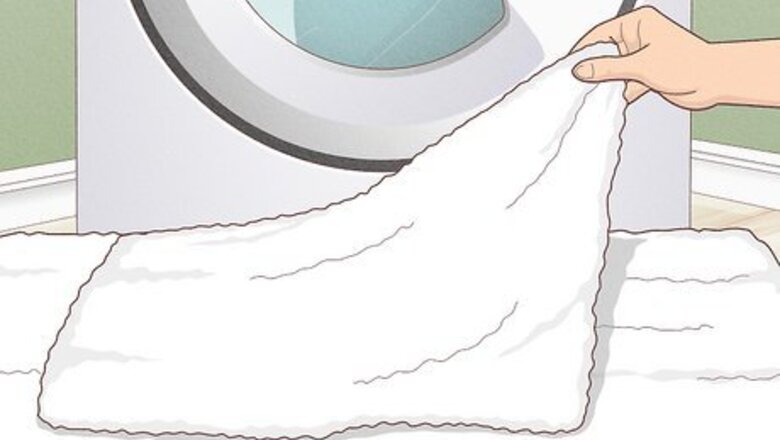
views
- Unplug the machine and wait a few minutes. Most doors will open once the power is off and the temperature cools off.
- Try knocking gently on the handle or pressing the pause/start button.
- Loop fishing line around the locked door and pull away from the door to manually unlock the locking mechanism.
- Alternatively, remove the panel at the top or bottom of the machine and pull on the color-coded tab to disable the locking mechanism.
Preventing Spills from Front-Loaders
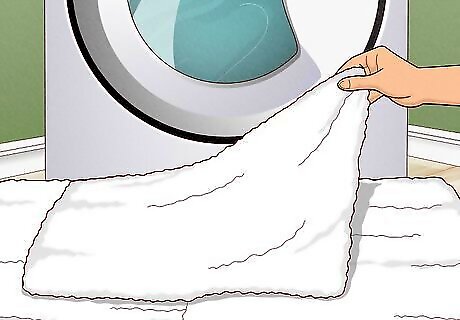
Set out towels under the machine if it’s mid-cycle. If your washing machine has stopped working or you’re trying to open the door mid-cycle, set 4-5 dry towels down under the washing machine’s door. This will soak up any water that spills over when you open the door. For a top-loading washer, go ahead and skip this section. You don’t really need to worry about water spilling out since none of the solutions involve tilting your machine over. If your washing machine is empty or it hasn’t filled with water yet, go ahead and skip this section.
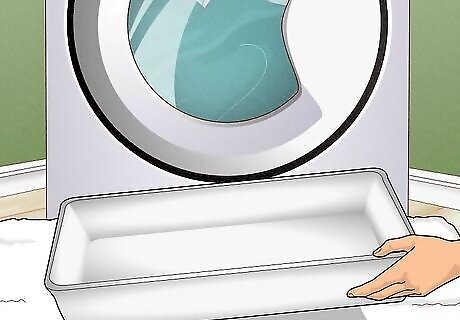
Lay a large pan or container in front of the door. If there’s a ton of water in your machine, the towels won’t be enough. Grab a few large baking pans, buckets, or plastic containers and set them out underneath the machine. If there’s a ton of water you won’t be able to catch all of it, but you’ll at least be able to stop most of the water from spilling over on to your floor. You can elevate the machine to raise the angle of your door with wood block or bricks if you want. If you do this, you have to be extremely careful though. If the machine slips down, you’ll have a heavy piece of machinery slamming into the floor. It’s usually better to just clean up the water afterwards.
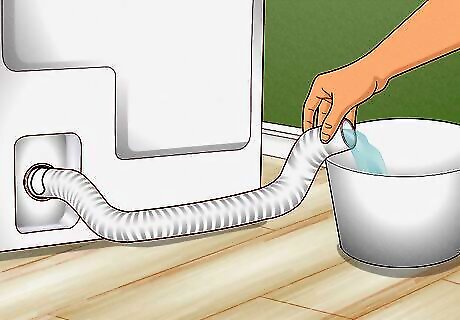
Pull your drain hose out and empty the water into a bucket. Go to the back of your dryer and locate the drain line. This is the hose that doesn’t connect to the hot and cold water lines on the wall. Either unscrew it by turning it counterclockwise, or simply pull it out of the seal. Keep it raised up and carefully lower it into a bucket that is lower than your machine’s door. The majority of your water will empty out into the bucket. This may not work if your drain line is blocked or the machine’s settings are locked in the mid-cycle settings. Your door may unlock as soon as you drain it. Some washers automatically lock if there’s a lot of water inside. Check to make sure that the drain hose is not inserted too far into the drain pipe at the wall.
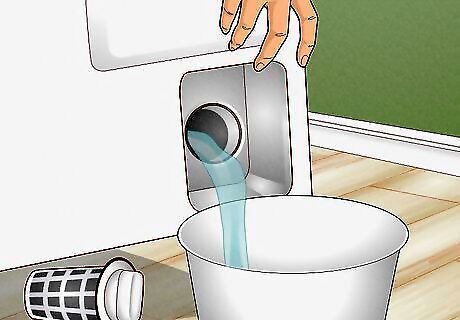
Drain the water through the filter if your machine has one. If you have a filter, pry the cover off with a flathead screwdriver or by hand. Raise the machine up and set a bucket underneath it. Reach carefully into the opening where the cover was and find the cap for your filter. Turn it counterclockwise by hand to loosen the filter and let the water flow out into the bucket. Be careful to not put your feet or hands under the machine while it’s raised up. You can use a brick or wood block to raise the machine up and set it on something stable. Lifting the machine can be pretty dangerous. If your machine is too heavy for you to raise on your own, you’re better off simply dealing with problem while the water is still inside the drum.
Using Fishing Line
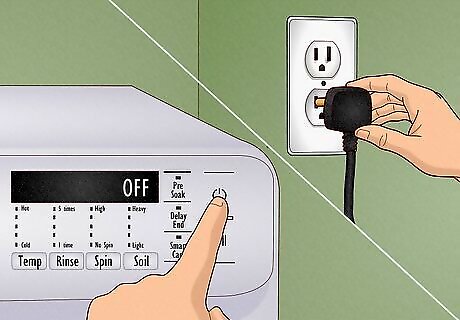
Turn the washing machine off and unplug it. If you’re in the middle of a cycle, turn the dial or press the button to pause or end the cycle. Wait 5-6 seconds to see if the door unlocks. If it doesn’t, turn the machine off by pressing the button or turning the dial all of the way to the off position. Unplug your machine.
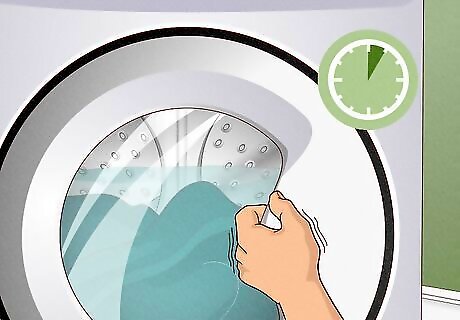
Wait 5 minutes and then try pulling on the handle. Some locks automatically undo the latch after the machine has been off for 5 minutes. After you’ve pulled the plug, wait for a few minutes. Then, try to open the door by pulling on the handle. This is going to be the solution for most top-loading machines. The latches on top-loaders are typically heat-activated and only lock when the machine is running. This feature is designed to give you access to your wet clothes in the event of a power outage or electrical failure.
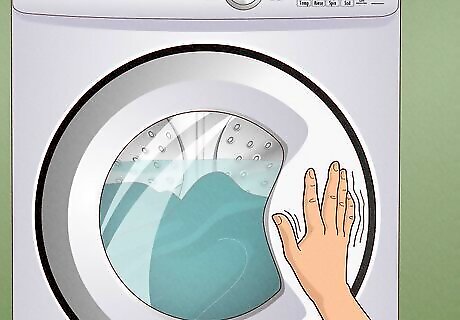
Strike the handle gently with an open palm to loosen it. If your door still isn’t unlocked, try loosening the lock with the power off. Use an open palm to gently strike the handle, right above the location of the lock. On some locks, this will be enough to shake it into the unlock position. Don’t hit the machine so hard that you hurt yourself or damage the door. A little vibration and abrupt pressure should be plenty if your door can be unlocked this way. This is less likely to work on a top-loading machine since the lock hooks around a loop inside of the machine.
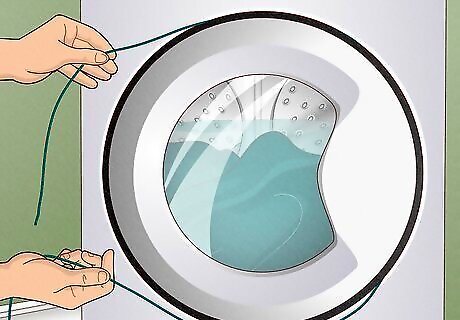
Loop a fishing line around the seam of the door. Grab some nylon string or a reel of fishing line. Pull out a 10–20 in (25–51 cm) length and slide it into the seam where your door meets the frame of the machine at the lock. Extend the length of your string or fishing line as you work it all the way around the door. Tie the end of the string in a knot once it’s completely wrapped around the door. If your handle seems loose, this is the best way to open the door. Sometimes a lose handle can’t trigger the lock to open because it isn’t connected to it. You need to tie the line on the side of the machine that is opposite to the lock. If you have a top-loading machine, pull it out from the wall. Go behind it and loop the fishing line around the seam where the lid closes. Tie it near the backside of the machine.
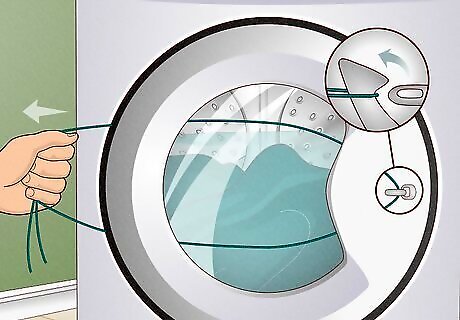
Pull the fishing line away from the handle to unlock it. Grab the fishing line or nylon string by the knot. Pull it carefully away from the door at an angle parallel to the front of the machine. Continue to apply pressure until you hear a clicking noise. When you do, hold the string in place with your nondominant hand and reach over to the handle. Pull it out to open the door. When you’re doing this, you’re physically pulling the lock out of the slot where it’s locked in place. If this doesn’t work, try using an old gift card or credit card to slide into the seam instead. Push the credit card into the lock to open it. On a top-loading machine, pull the string parallel to the lid, towards the backside of the machine.
Disabling the Lock
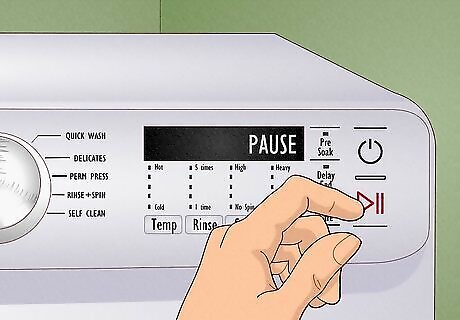
Press “pause” or “start” to try opening the door. This may sound obvious, but you may not have pressed the pause button to stop the cycle. Try pressing “pause” and wait 1-2 minutes to see if the door unlocks. Most locks will not open when a cycle is actively running so try this first to see if the door opens after pausing the cycle. On some machines, the “start” button functions as the pause button when the cycle is on.
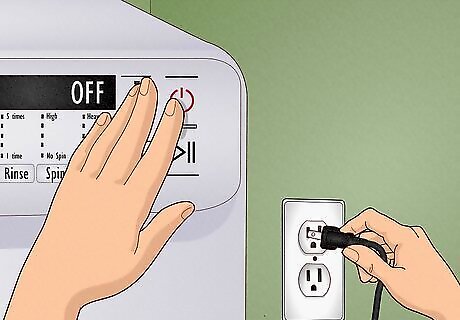
Turn the washing machine off and unplug it. If pausing the cycle doesn’t unlock the door, turn the machine off. Then, unplug the machine and wait 5-10 minutes. Try pulling the handle again to see if the door opens. Some locks automatically flip into the unlocked position after 5-10 minutes so that you can get your clothes during a power outage.
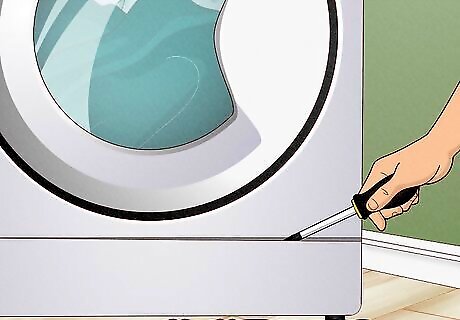
Slide a flathead screwdriver in the seam of the bottom panel. Inspect the bottom of your washing machine on the front. There is a 2–6 in (5.1–15.2 cm) panel that appears to be a part of the machine. On the right side of the machine, slide a flathead screwdriver in between the frame and this bottom panel. On a top loader, this panel will be at the top. You can use a dull kitchen or butter knife instead of a flathead screwdriver. Keep in mind, you may end up bending it though. You can start on the left if you’d like. It really doesn’t matter so long as you don’t start in the center. If you do that, you may crack the panel since the tension is strongest in the center.
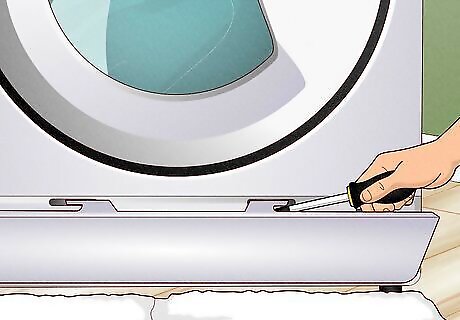
Pull the screwdriver handle up to pop the panel off. With the head of the screwdriver wedged in between the 2 panels, slide the handle up with moderate pressure to pop the panel off. Do this slowly to ensure that you don’t bend or break the panel. Once the right side is off, repeat the process on the left side. If this isn’t working, consult the washing machine’s instruction manual. There may be a switch or a latch under your machine that you need to use to get this panel off.
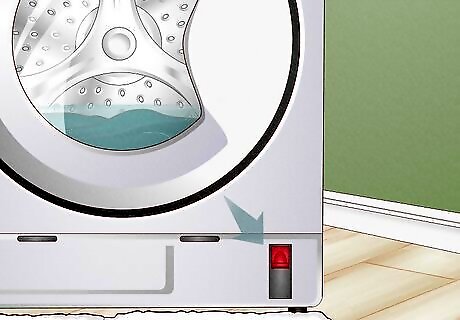
Find the plastic tab sticking out under the handle. With the bottom panel set aside, look at the top of the section that you removed for a small plastic tab that is sticking out of the machine. This tab is usually directly under the lock on the handle, and it’s often color-coded to make it easy to find. This tab is connected to the lock directly. It’s a safety measure designed to manually unlock the machine in the event that the computer in the washer fails.
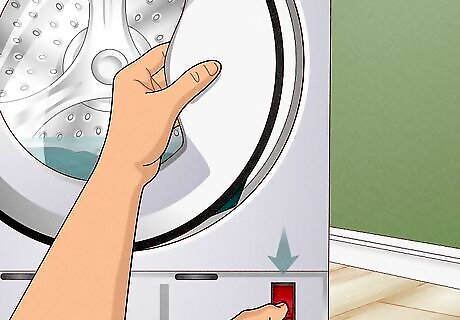
Pull the tab down 1–3 in (2.5–7.6 cm) while opening the front door. Once you’ve found the tab, grip it between your thumb and index finger. Pull slightly on the tab to bring it down 1–3 in (2.5–7.6 cm). With the tab pulled down, pull on your door handle to open it. If your door still won’t open, contact a washing machine repair company. There may be a physical defect in the lock holding it shut.
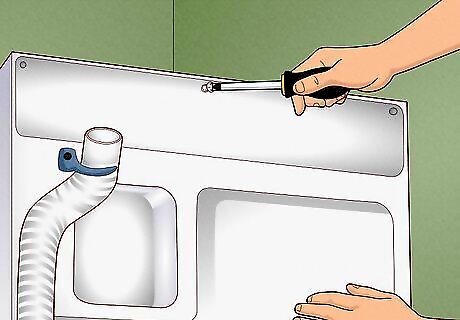
Unscrew the bolts in the back of a top-loading machine to lift it up. Turn your top-loading machine around so that you can access the back. Look for 3-4 screws or bolts that are at the same height as your door. Unscrew them with a wrench, screwdriver, or channel locks and remove them. Then, lift the entire top of the machine up by raising it from the top panel. If unplugging the machine didn’t resolve the problem for your top loader, the lock may be magnetic. This is common on digital machines. If you have a magnetic lock, you can’t pry it open or trick it into unlocking. Instead, lift the entire panel up.



















Comments
0 comment